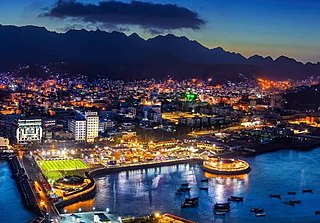
The Palestinian Authority, officially known as the Palestinian National Authority or the State of Palestine, is the Fatah-controlled government body that exercises partial civil control over the Palestinian enclaves in the Israeli-occupied West Bank as a consequence of the 1993–1995 Oslo Accords. The Palestinian Authority controlled the Gaza Strip prior to the Palestinian elections of 2006 and the subsequent Gaza conflict between the Fatah and Hamas parties, when it lost control to Hamas; the PA continues to claim the Gaza Strip, although Hamas exercises de facto control. Since January 2013, following United Nations General Assembly resolution 67/19, the Palestinian Authority has used the name "State of Palestine" on official documents, without prejudice to the Palestinian Liberation Organization (PLO) role as "representative of the Palestinian people".

The economy of Saudi Arabia is the second-largest in the Middle East and the seventeenth-largest in the world. The Saudi economy is highly reliant on its petroleum sector. Oil accounts on average in recent years for approximately 40% of Saudi GDP and 75% of fiscal revenue, with substantial fluctuations depending on oil prices each year.
The Office of the United Nations High Commissioner for Refugees (UNHCR) is a United Nations agency mandated to aid and protect refugees, forcibly displaced communities, and stateless people, and to assist in their voluntary repatriation, local integration or resettlement to a third country. It is headquartered in Geneva, Switzerland, with over 18,879 staff working in 138 countries as of 2020.

The United Nations Relief and Works Agency for Palestine Refugees in the Near East is a UN agency that supports the relief and human development of Palestinian refugees. UNRWA's mandate encompasses Palestinians who fled or were expelled during the Nakba, the 1948 Palestine War, and subsequent conflicts, as well as their descendants, including legally adopted children. As of 2019, more than 5.6 million Palestinians are registered with UNRWA as refugees.

The economy of Yemen has significantly weakened since the breakout of the Yemeni Civil War and the humanitarian crisis, which has caused instability, escalating hostilities, and flooding in the region. At the time of unification, South Yemen and North Yemen had vastly different but equally struggling underdeveloped economic systems. Since unification, the economy has been forced to sustain the consequences of Yemen's support for Iraq during the 1990–91 Persian Gulf War: Saudi Arabia expelled almost 1 million Yemeni workers, and both Saudi Arabia and Kuwait significantly reduced economic aid to Yemen. The 1994 civil war further drained Yemen's economy. As a consequence, Yemen has relied heavily on aid from multilateral agencies to sustain its economy for the past 24 years. In return, it has pledged to implement significant economic reforms. In 1997 the International Monetary Fund (IMF) approved two programs to increase Yemen's credit significantly: the enhanced structural adjustment facility and the extended funding facility (EFF). In the ensuing years, Yemen's government attempted to implement recommended reforms: reducing the civil service payroll, eliminating diesel and other subsidies, lowering defense spending, introducing a general sales tax, and privatizing state-run industries. However, limited progress led the IMF to suspend funding between 1999 and 2001.

A refugee, according to the United Nations High Commissioner for Refugees (UNHCR), is a person "forced to flee their own country and seek safety in another country. They are unable to return to their own country because of feared persecution as a result of who they are, what they believe in or say, or because of armed conflict, violence or serious public disorder." Such a person may be called an asylum seeker until granted refugee status by a contracting state or by the UNHCR if they formally make a claim for asylum.
Palestinian refugees are citizens of Mandatory Palestine, and their descendants, who fled or were expelled from their country, village or house over the course of the 1948 Palestine war and during the 1967 Six-Day War. Most Palestinian refugees live in or near 68 Palestinian refugee camps across Jordan, Lebanon, Syria, the West Bank and the Gaza Strip. In 2019 more than 5.6 million Palestinian refugees were registered with the United Nations.

The Middle East and North Africa (MENA), also referred to as West Asia and North Africa (WANA) or South West Asia and North Africa (SWANA), is a geographic region which comprises the Middle East and North Africa together. However, it is widely considered to be a more defined and apolitical alternative to the concept of the Greater Middle East, which comprises the bulk of the Muslim world. The region has no standardized definition and groupings may vary, but the term typically includes countries like Algeria, Bahrain, Egypt, Jordan, Kuwait, Lebanon, Libya, Morocco, Oman, Qatar, Saudi Arabia, Syria, Tunisia, the UAE, and Yemen.

The Saudi Telecom Company, trading as STC Group provides ICT services in the Kingdom of Saudi Arabia, across the Middle East and Europe. The group offers landline and fixed infrastructure, mobile and data services, and broadband & cloud computing services. It also offers online payments, telecommunications, IOT, 5G, e-gaming, cybersecurity, digital entertainment, and fintech.
International aid has been provided to Palestinians since at least the 1948 Arab–Israeli War. The Palestinians view the aid as keeping the Israeli–Palestinian peace process going, while Israelis and other foreign policy authorities have raised concerns that it is used to fund terrorism and removes the imperative for Palestinians to negotiate a settlement of the Israeli–Palestinian conflict. As a provision of the Oslo Accords, international aid was to be provided to the Palestinians to ensure economic solvency for the Palestinian National Authority (PA). In 2004, it was reported that the PA, within the West Bank and Gaza Strip, receives one of the highest levels of aid in the world. In 2006, economic sanctions and other measures were taken by several countries against the PA, including suspension of international aid following Hamas' victory at the Palestinian Legislative Council election. Aid to the PA resumed in 2008 following the Annapolis Conference, where Hamas was not invited. Aid has been provided to the Palestinian Authority, Palestinian non-governmental organizations (PNGOs) as well as Palestinian political factions by various foreign governments, international organizations, international non-governmental organizations (INGOs), and charities, besides other sources.
International Organization for Relief, Welfare and Development, formerly known as the International Islamic Relief Organization or International Islamic Relief Organization of Saudi Arabia (IIROSA), is a charity based in Saudi Arabia founded by the Muslim World League in 1978. It is a full member of The Conference of NGOs, where it serves on the board. The IIRO is included in a list of some of the UNHCR's major NGO partners and has been involved in many joint programmes with UN Agencies and intergovernmental and non-governmental organisations. It has enjoyed consultative status on the United Nations Economic and Social Council since 1995. It was the first Islamic NGO to gain observer status with the International Organisation for Migration (IOM). It used also to be a member of the International Humanitarian City based in Dubai, UAE.
Issues relating to the State of Palestine and aspects of the Israeli–Palestinian conflict occupy continuous debates, resolutions, and resources at the United Nations. Since its founding in 1948, the United Nations Security Council, as of January 2010, has adopted 79 resolutions directly related to the Arab–Israeli conflict.
Since the 1980s Saudi Arabia has provided foreign assistance to many countries and organizations.

India–Saudi Arabia relations, also referred to as Indian-Saudi relations or Indo-Saudi relations, are the bilateral relations between the Republic of India and the Kingdom of Saudi Arabia. Relations between the two nations are generally strong and close, especially in commercial interests. Indo-Saudi bilateral trade reached US$27.48 billion in the financial year 2017–18, up from US$25.1 billion in the preceding year. Saudi Arabia's exports to India stood at US$22.06 billion whereas India's exports were US$5.41 billion.

Rabigh Refining & Petrochemical Company is a Saudi Arabia–based company which produces and markets refined hydrocarbon and petrochemicals. It was founded in 2005 as a joint venture between Saudi Aramco and Japan’s Sumitomo Chemical, and is now publicly held and traded on the Saudi Stock Exchange (TADAWUL:2380).
Qatar Charity is a humanitarian and development non-governmental organization in the Middle East. It was founded in 1992 in response to the thousands of children who were made orphans by the Afghanistan war and while orphans still remain a priority cause in the organization's work with more than 150,000 sponsored orphans, it has now expanded its fields of action to include six humanitarian fields and seven development fields.

The 2018 Jordanian protests started as a general strike organized by more than 30 trade unions on 30 May 2018 after the government of Hani Mulki submitted a new tax law to Parliament. The bill followed IMF-backed austerity measures adopted by Mulki's government since 2016 that aimed to tackle Jordan's growing public debt. Although Jordan had been relatively unscathed from the violence that swept the region following the 2011 Arab Spring, its economy had taken a hit from the surrounding turmoil and from an influx of a large number of Syrian refugees into the country. Jordan also hosts a large contingent of Iraqi and Palestinian refugees, further straining its finances. The UNHCR places Jordan as the world's second largest host of refugees per capita.

Azerbaijan–Saudi Arabia relations are the bilateral relations between Azerbaijan and Saudi Arabia.

The Abraham Accords are bilateral agreements on Arab–Israeli normalization signed between Israel and the United Arab Emirates and between Israel and Bahrain on September 15, 2020. Mediated by the United States, the announcement of August 13, 2020, concerned Israel and the Emirates before the subsequent announcement of an agreement between Israel and Bahrain on September 11, 2020. On September 15, 2020, the signing of the agreements was hosted by US president Trump on the Truman Balcony of the White House amid elaborate staging intended to evoke the signings of historic formal peace treaties in prior administrations.

The relationship between the United Nations Relief and Works Agency for Palestine Refugees in the Near East (UNRWA) and Israel is a feature of the Israeli–Palestinian conflict. For decades, UNRWA has faced Israeli allegations surrounding its neutrality. It is the largest relief organization in the Gaza Strip which is currently undergoing a humanitarian crisis during the Israel–Hamas war. UNRWA was created as a United Nations agency in 1949 to support the relief of Palestinian refugees in the wake of their expulsion and flight during the 1948 Palestine war. After Israel captured the West Bank and Gaza in the 1967 Six-Day War, it requested that UNRWA continue its operations there, which it would facilitate.













